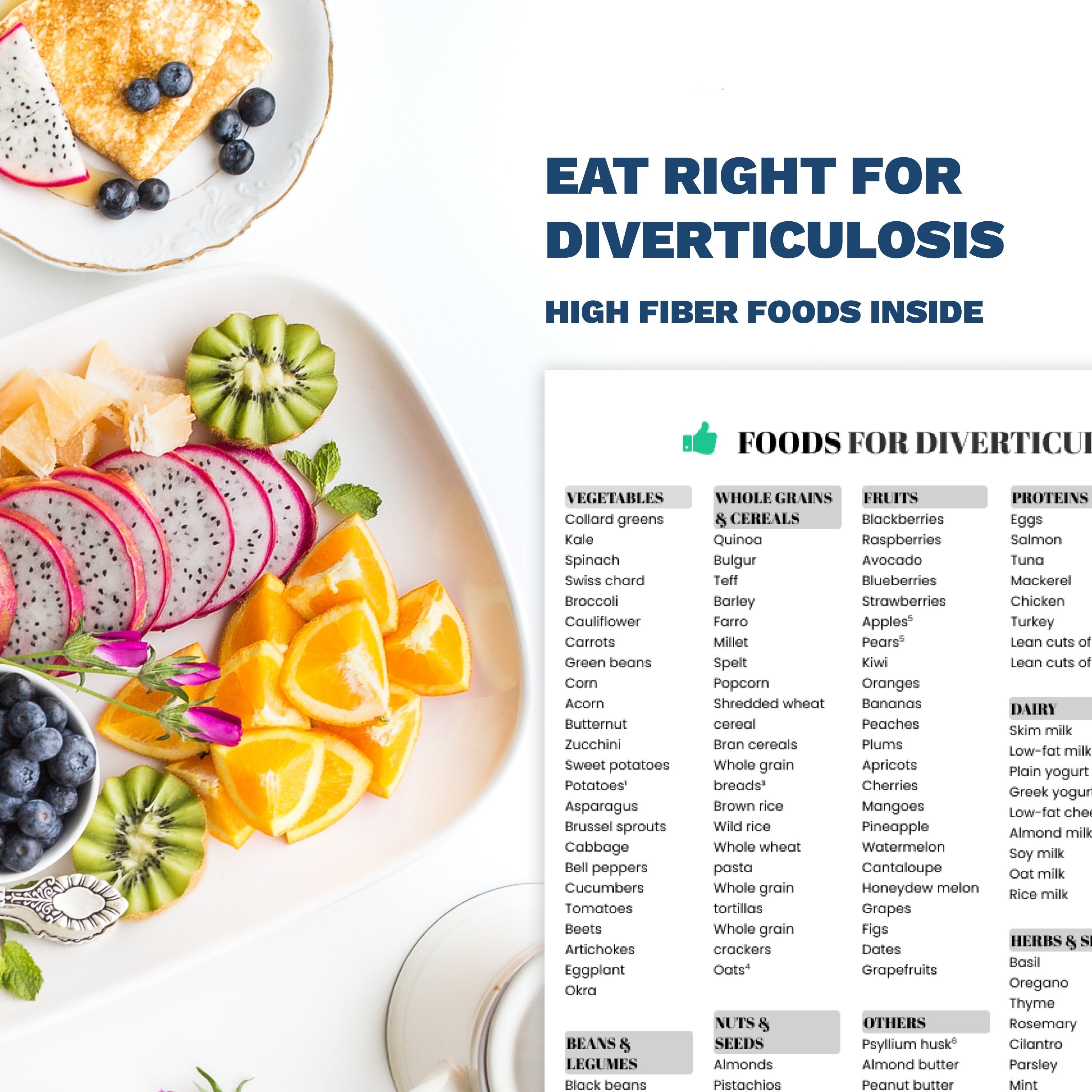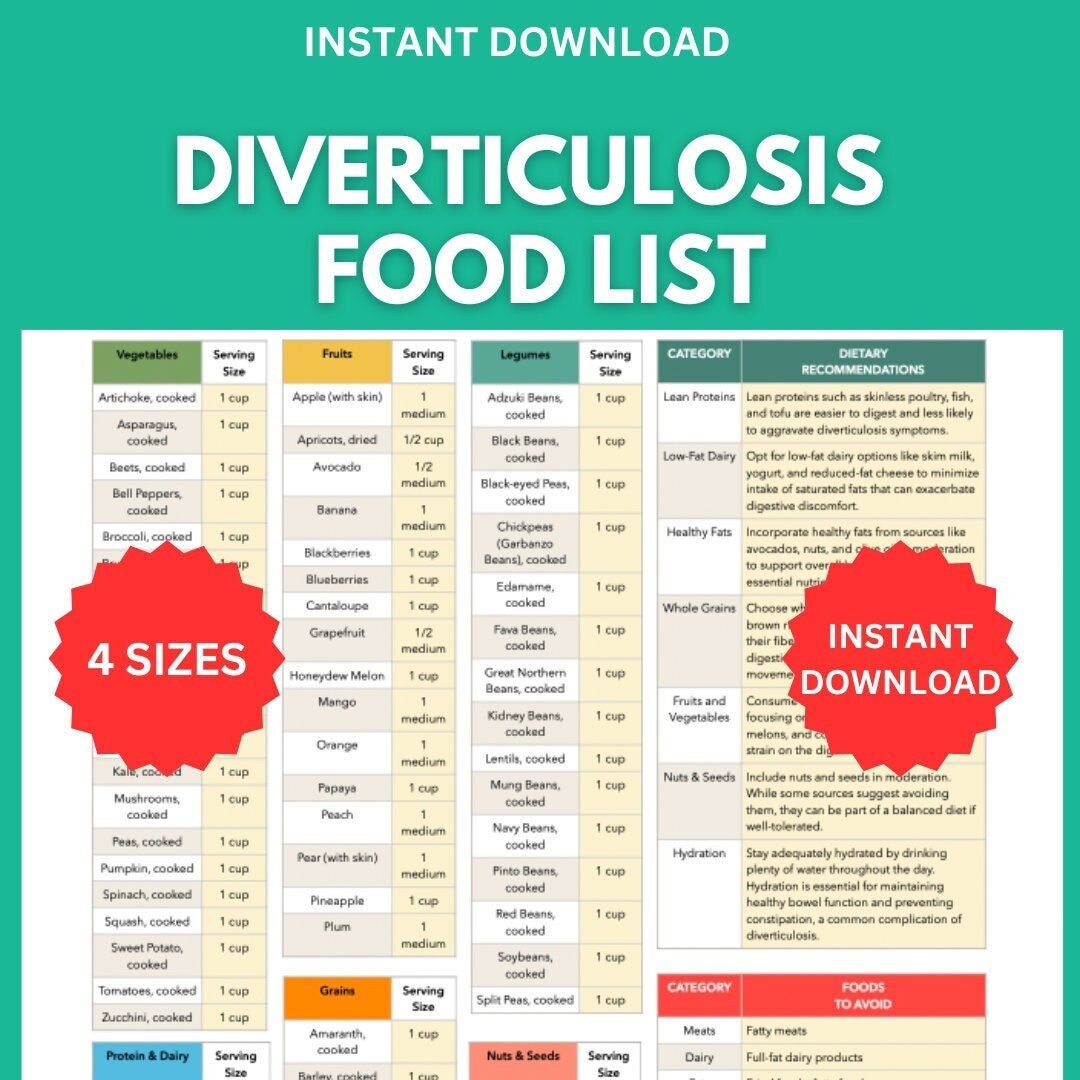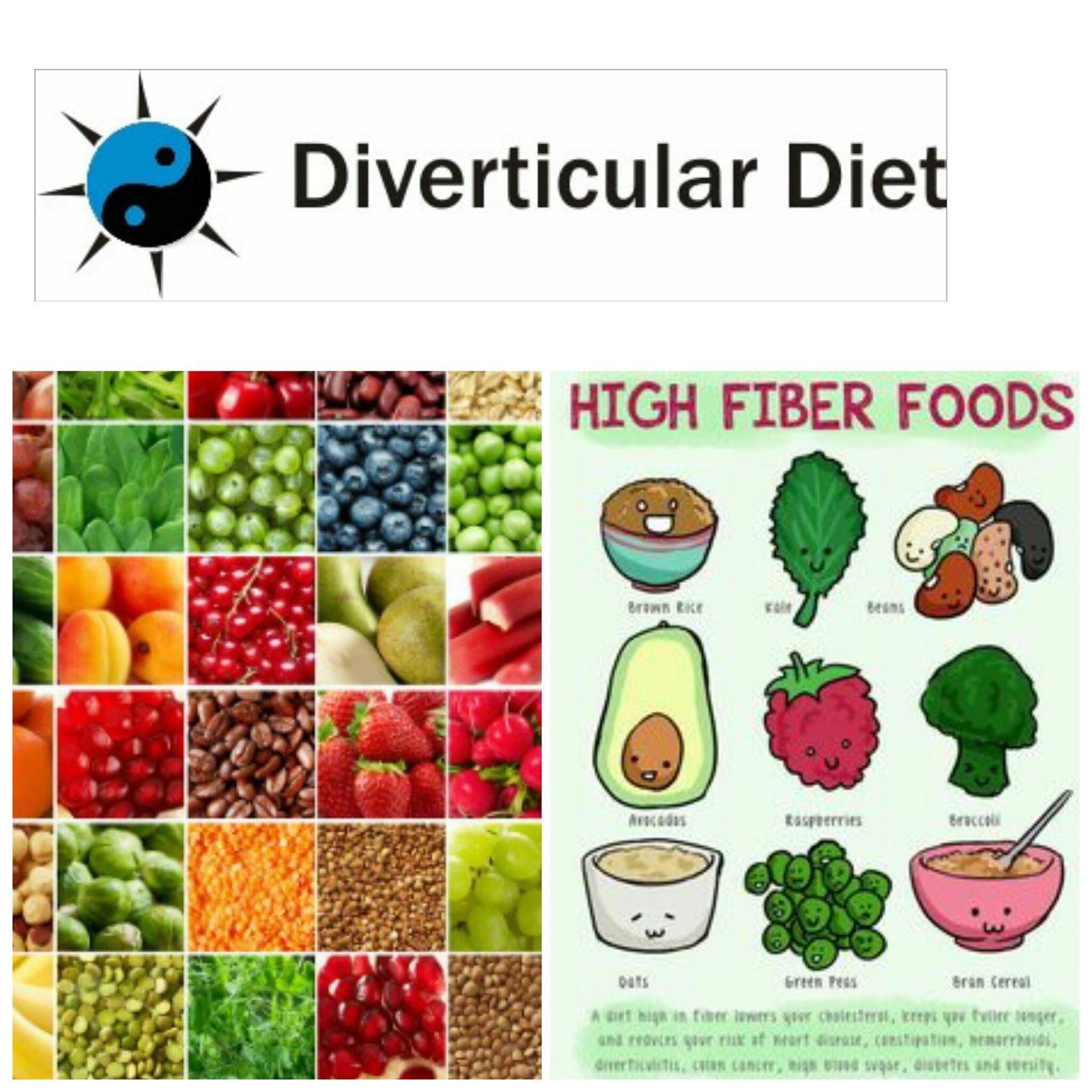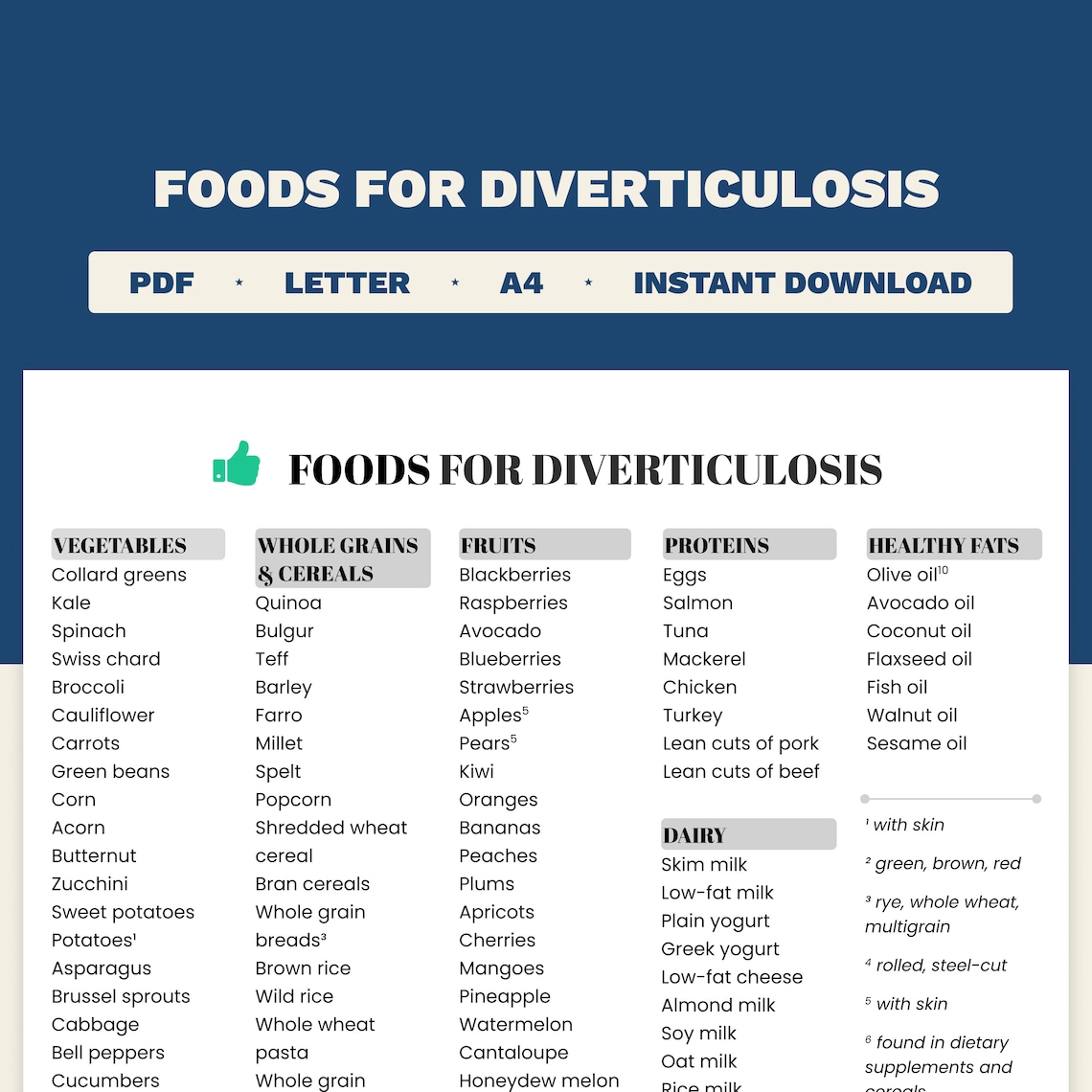Printable Diverticulosis Diet
Printable Diverticulosis Diet - This resource will help you choose what to eat to help manage diverticular disease. It is recommended that patients with diverticular disease eat a healthy, balanced diet including good sources of fibre from wholegrains, fruit and vegetables and ensure having adequate fluid. The disease was first noticed in the united states in the. The following steps may help reduce the risk of getting diverticular disease or a flare up of diverticulitis. Individuals experiencing episodes of diverticulitis are recommended to adjust their diet as it has been proven to significantly improve most of their symptoms. Dietary fibre is part of fruits, grains and vegetables that our bodies are unable to digest and thus helps to improve the bulk of stools and helps to keep bowel motions regular. Patients find that a diet food list for diverticulitis including examples of clear liquids, bland foods, and foods with fiber, helps when selecting what to eat during episodes of discomfort. During episodes of diverticulitis, it is helpful to eat a relatively bland diet avoiding irritant foods. The average american diet includes only about 12 to 15 grams (g) of fiber a. However, if you are experiencing symptoms, particularly diarrhoea. Coffee and tea without milk or nondairy creamer. While a diet high in fiber may help prevent diverticulosis and thus diverticulitis; How is a diverticulosis diet different from a regular diet? Diverticulosis is a common condition that affects your large intestine. With diverticulitis, what you eat and drink can depend on your symptoms. Even though about 58% of people over the age of 60 have this condition, most people never experience symptoms. The disease was first noticed in the united states in the. This resource will help you choose what to eat to help manage diverticular disease. Individuals experiencing episodes of diverticulitis are recommended to adjust their diet as it has been proven to significantly improve most of their symptoms. Dietary fibre is part of fruits, grains and vegetables that our bodies are unable to digest and thus helps to improve the bulk of stools and helps to keep bowel motions regular. Diverticulosis is a common condition that affects your large intestine. Traditionally, patients with diverticular disease have been advised to follow a high fibre diet to manage their symptoms. A high fiber diet is still overall recommended to reduce risk of diverticulosis as well as diverticulitis (inflamed diverticula) that may develop from diverticulosis. Coffee and tea without milk or nondairy creamer.. Diverticulosis is a common condition that affects your large intestine. The average american diet includes only about 12 to 15 grams (g) of fiber a. While a diet high in fiber may help prevent diverticulosis and thus diverticulitis; With diverticulitis, what you eat and drink can depend on your symptoms. It is a common belief that when you have. On a clear liquid diet, you can eat: Coffee and tea without milk or nondairy creamer. Diverticulosis is a common condition that affects your large intestine. Dietary fibre is part of fruits, grains and vegetables that our bodies are unable to digest and thus helps to improve the bulk of stools and helps to keep bowel motions regular. It is. With diverticulitis, what you eat and drink can depend on your symptoms. While a diet high in fiber may help prevent diverticulosis and thus diverticulitis; It is a common belief that when you have. The average american diet includes only about 12 to 15 grams (g) of fiber a. These are high fibre foods such as onions, fruit and vegetable. A high fiber diet is still overall recommended to reduce risk of diverticulosis as well as diverticulitis (inflamed diverticula) that may develop from diverticulosis. Adding more fibre to your diet may help reduce the chances of developing symptoms or other complications of diverticulitis in the future. How is a diverticulosis diet different from a regular diet? Enjoy a healthy diet. The average american diet includes only about 12 to 15 grams (g) of fiber a. It occurs when small pouches form in your intestine and push outward, like tiny balloons, at weak spots in your colon. A high fiber diet is still overall recommended to reduce risk of diverticulosis as well as diverticulitis (inflamed diverticula) that may develop from diverticulosis.. A high fiber diet is still overall recommended to reduce risk of diverticulosis as well as diverticulitis (inflamed diverticula) that may develop from diverticulosis. How is a diverticulosis diet different from a regular diet? Eat higher fibre foods often fibre may help prevent diverticula (sacs or pouches in the colon) from forming and may make symptoms. Coffee and tea without. Diverticular disease is when small pockets develop in the lining of the. How is a diverticulosis diet different from a regular diet? Eat higher fibre foods often fibre may help prevent diverticula (sacs or pouches in the colon) from forming and may make symptoms. With diverticulitis, what you eat and drink can depend on your symptoms. Even though about 58%. Even though about 58% of people over the age of 60 have this condition, most people never experience symptoms. The average american diet includes only about 12 to 15 grams (g) of fiber a. Adding more fibre to your diet may help reduce the chances of developing symptoms or other complications of diverticulitis in the future. A high fiber diet. How is a diverticulosis diet different from a regular diet? During episodes of diverticulitis, it is helpful to eat a relatively bland diet avoiding irritant foods. Enjoy a healthy diet that includes a wide variety of foods. Dietary fibre is part of fruits, grains and vegetables that our bodies are unable to digest and thus helps to improve the bulk. Adding more fibre to your diet may help reduce the chances of developing symptoms or other complications of diverticulitis in the future. The average american diet includes only about 12 to 15 grams (g) of fiber a. Even though about 58% of people over the age of 60 have this condition, most people never experience symptoms. These are high fibre foods such as onions, fruit and vegetable skins, seeds and nuts. This resource will help you choose what to eat to help manage diverticular disease. Diverticulosis is a common condition that affects your large intestine. Dietary fibre is part of fruits, grains and vegetables that our bodies are unable to digest and thus helps to improve the bulk of stools and helps to keep bowel motions regular. The disease was first noticed in the united states in the. Enjoy a healthy diet that includes a wide variety of foods. The following steps may help reduce the risk of getting diverticular disease or a flare up of diverticulitis. Traditionally, patients with diverticular disease have been advised to follow a high fibre diet to manage their symptoms. A high fiber diet is still overall recommended to reduce risk of diverticulosis as well as diverticulitis (inflamed diverticula) that may develop from diverticulosis. It is recommended that patients with diverticular disease eat a healthy, balanced diet including good sources of fibre from wholegrains, fruit and vegetables and ensure having adequate fluid. Patients find that a diet food list for diverticulitis including examples of clear liquids, bland foods, and foods with fiber, helps when selecting what to eat during episodes of discomfort. While a diet high in fiber may help prevent diverticulosis and thus diverticulitis; Individuals experiencing episodes of diverticulitis are recommended to adjust their diet as it has been proven to significantly improve most of their symptoms.Printable Diverticulosis Food Diverticulitis Food Chart
Printable Diverticulosis Diet Handout
Comprehensive Foods for Diverticulosis List Highfiber Diet Guide for
Printable Diverticulosis Diet Handout
Diverticulosis Food List, Printable Diverticulosis Food List With Gut
Diverticulosis Food Diverticulitis Food Chart
Printable Diverticulosis Food Diverticulitis Food Chart
Printable Diverticulosis Food Diverticulitis Food Chart
Printable Diverticulosis Food Diverticulitis Food Chart
Comprehensive Foods for Diverticulosis List Highfiber Diet Guide for
Enjoy A Healthy Diet That Includes A Wide Variety Of Foods.
How Is A Diverticulosis Diet Different From A Regular Diet?
A Diet Low In Fiber May Help Reduce Gi Discomfort During Flares Of Diverticulitis By Reducing Frequency Of Stools.
It Is A Common Belief That When You Have.
Related Post:









